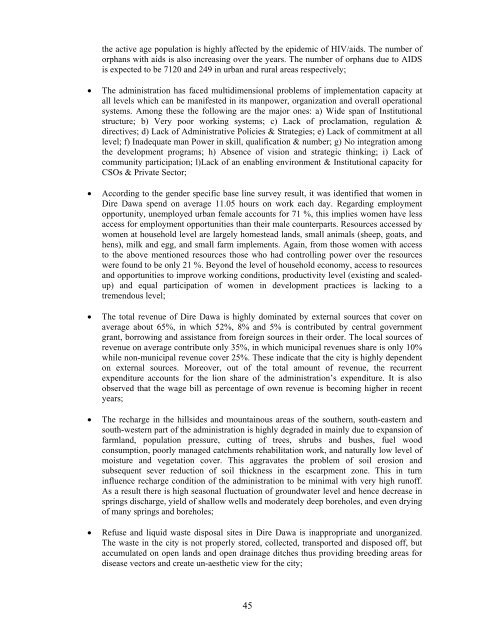Regional Reports - the European External Action Service
Regional Reports - the European External Action Service
Regional Reports - the European External Action Service
You also want an ePaper? Increase the reach of your titles
YUMPU automatically turns print PDFs into web optimized ePapers that Google loves.
<strong>the</strong> active age population is highly affected by <strong>the</strong> epidemic of HIV/aids. The number of<br />
orphans with aids is also increasing over <strong>the</strong> years. The number of orphans due to AIDS<br />
is expected to be 7120 and 249 in urban and rural areas respectively;<br />
• The administration has faced multidimensional problems of implementation capacity at<br />
all levels which can be manifested in its manpower, organization and overall operational<br />
systems. Among <strong>the</strong>se <strong>the</strong> following are <strong>the</strong> major ones: a) Wide span of Institutional<br />
structure; b) Very poor working systems; c) Lack of proclamation, regulation &<br />
directives; d) Lack of Administrative Policies & Strategies; e) Lack of commitment at all<br />
level; f) Inadequate man Power in skill, qualification & number; g) No integration among<br />
<strong>the</strong> development programs; h) Absence of vision and strategic thinking; i) Lack of<br />
community participation; l)Lack of an enabling environment & Institutional capacity for<br />
CSOs & Private Sector;<br />
• According to <strong>the</strong> gender specific base line survey result, it was identified that women in<br />
Dire Dawa spend on average 11.05 hours on work each day. Regarding employment<br />
opportunity, unemployed urban female accounts for 71 %, this implies women have less<br />
access for employment opportunities than <strong>the</strong>ir male counterparts. Resources accessed by<br />
women at household level are largely homestead lands, small animals (sheep, goats, and<br />
hens), milk and egg, and small farm implements. Again, from those women with access<br />
to <strong>the</strong> above mentioned resources those who had controlling power over <strong>the</strong> resources<br />
were found to be only 21 %. Beyond <strong>the</strong> level of household economy, access to resources<br />
and opportunities to improve working conditions, productivity level (existing and scaled-<br />
up) and equal participation of women in development practices is lacking to a<br />
tremendous level;<br />
• The total revenue of Dire Dawa is highly dominated by external sources that cover on<br />
average about 65%, in which 52%, 8% and 5% is contributed by central government<br />
grant, borrowing and assistance from foreign sources in <strong>the</strong>ir order. The local sources of<br />
revenue on average contribute only 35%, in which municipal revenues share is only 10%<br />
while non-municipal revenue cover 25%. These indicate that <strong>the</strong> city is highly dependent<br />
on external sources. Moreover, out of <strong>the</strong> total amount of revenue, <strong>the</strong> recurrent<br />
expenditure accounts for <strong>the</strong> lion share of <strong>the</strong> administration’s expenditure. It is also<br />
observed that <strong>the</strong> wage bill as percentage of own revenue is becoming higher in recent<br />
years;<br />
• The recharge in <strong>the</strong> hillsides and mountainous areas of <strong>the</strong> sou<strong>the</strong>rn, south-eastern and<br />
south-western part of <strong>the</strong> administration is highly degraded in mainly due to expansion of<br />
farmland, population pressure, cutting of trees, shrubs and bushes, fuel wood<br />
consumption, poorly managed catchments rehabilitation work, and naturally low level of<br />
moisture and vegetation cover. This aggravates <strong>the</strong> problem of soil erosion and<br />
subsequent sever reduction of soil thickness in <strong>the</strong> escarpment zone. This in turn<br />
influence recharge condition of <strong>the</strong> administration to be minimal with very high runoff.<br />
As a result <strong>the</strong>re is high seasonal fluctuation of groundwater level and hence decrease in<br />
springs discharge, yield of shallow wells and moderately deep boreholes, and even drying<br />
of many springs and boreholes;<br />
• Refuse and liquid waste disposal sites in Dire Dawa is inappropriate and unorganized.<br />
The waste in <strong>the</strong> city is not properly stored, collected, transported and disposed off, but<br />
accumulated on open lands and open drainage ditches thus providing breeding areas for<br />
disease vectors and create un-aes<strong>the</strong>tic view for <strong>the</strong> city;<br />
45

















